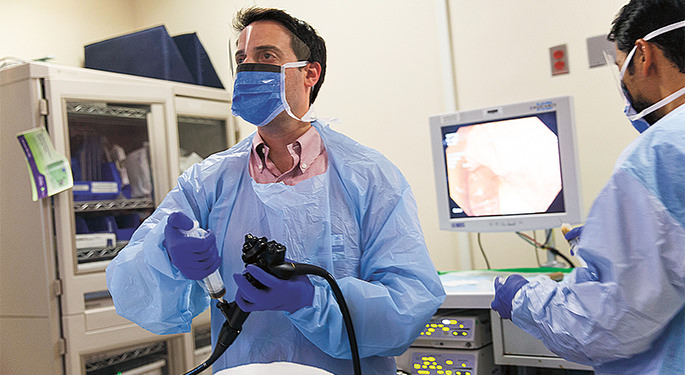Fecal Microbial Transplant

Fecal microbial transplantation (FMT) is a remarkably effective treatment for an infection called Clostridium difficile (C. diff). Here at Mount Sinai, we have had consistent success with FMT in curing C. diff, a serious and common infection of the colon. At Mount Sinai, our doctors and staff combine leading science with compassion to provide a customized care plan that is right for you.
What is the Microbiome?
There are 10 times more bacterial cells (microbes) in a human body than human cells. This bacterial community is very rich and diverse.
- Microbiota refers to the bacteria or microbes themselves.
- Microbiome refers to these microbes plus their genetic material (DNA) that lives in a specific part of the body or environment.
- Gut microbiome is the environment of the large intestine or colon
The gut microbiome is an incredibly complex network of microbes that play an important role in maintaining your health. Medications like antibiotics, or an underlying medical problem like inflammatory bowel disease (IBD), can disrupt your gut microbiome. Sometimes these changes in the gut microbiome can lead to a disease, most notably the C. diff infection.
Why FMT?
C. diff infection leads to severe diarrhea and very serious inflammation of the colon. While standard treatment for this infection involves antibiotics, many patients continue to suffer from repeat infections, making antibiotics ineffective. Instead, fecal microbial transplantation (FMT) transfers a healthy microbiome from a healthy person to the patient suffering from C. diff.
FMT essentially repopulates the gut with rich, healthy microbes. FMT has been shown to be remarkably effective at treating resistant C. diff infections. At Mount Sinai, we have been performing FMT since 2013. We offer FMT via colonoscopy, upper endoscopy, and capsules.
Are You a Candidate for FMT?
Current Food and Drug Administration (FDA) guidance allows FMT only for the treatment of C. diff infection that is not responsive to standard antibiotic therapy.
According to the American Gastroenterological Association, FMT may be an option if you have had:
- At least three episodes of mild to moderate C. diff infection that has recurred despite six to eight weeks of treatment with antibiotics
- At least two episodes of severe C. diff infection that required hospitalization
- Moderate C. diff infection that did not respond to antibiotics for at least one week
- Severe C. diff infection or severe colitis caused by C. diff that did not respond to antibiotics within two days
Preparing for FMT
If you are a candidate for FMT, you need to follow preparation instructions, such as:
- 48 hours before FMT: Stop talking all antibiotics
- 24 hours before FMT: Follow standard bowel preparation instructions with clear liquids and bowel cleanse
- Day of FMT: Take nothing by mouth except for medications with a small sip of water
- Two hours before FMT: Take two tablets of Imodium (loperamide) by mouth with a small sip of water
Your doctor will give you specific instructions. Be sure to ask your doctor any questions you have about preparing for FMT.
FMT Research
There is the possibility that FMT may be helpful in treating other conditions including inflammatory bowel disease (IBD), irritable bowel syndrome (IBS), obesity, liver disease, neurocognitive disorders, and more. However, at this time, we can only consider FMT for these conditions in a research setting.
Here at Mount Sinai, we are engaged in a number of research projects involving FMT. We have ongoing trials exploring the use of FMT capsules for C. diff and exploring the effect of FMT in patients with C. diff and IBD.
Learn more about clinical trials.